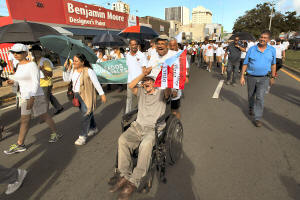U.S. Supreme Court to examine Puerto Rico's exclusion from benefits
program
 Send a link to a friend
Send a link to a friend
 [March 02, 2021]
By Lawrence Hurley [March 02, 2021]
By Lawrence Hurley
WASHINGTON (Reuters) - The U.S. Supreme
Court on Monday agreed to decide the legality of a decades-old
congressional decision to exclude Puerto Rico from a federal program
that provides benefits to low-income elderly, blind and disabled people.
The justices took up a U.S. government appeal originally filed by
Republican former President Donald Trump's administration of a lower
court ruling that found the exclusion unlawful.
Many Puerto Ricans have long complained that the Caribbean island's
residents are treated worse than other Americans despite being U.S.
citizens. Puerto Rico, which is not a state, is the most-populous of the
U.S. territories, with about 3 million people.

The Boston-based 1st U.S. Circuit Court of Appeals ruled last year in
favor of a Puerto Rican resident named Jose Luis Vaello-Madero who had
previously received Supplemental Security Income (SSI) benefits when he
lived in New York but lost eligibility when he moved to Puerto Rico in
2013.
The 1st Circuit decided that Puerto Rico's exclusion from the program
violated a provision of the U.S. Constitution that requires that laws
apply equally to everyone.
Vaello-Madero, who is 66 years old and disabled, mounted his
constitutional challenge after the government sued him in federal court
in Washington in 2017 seeking more than $28,000 for payments it had made
to him after he moved to Puerto Rico.
The SSI benefits are available to any U.S. citizen living in any of the
50 states, Washington, D.C., and the Northern Mariana Islands, but not
the territories of Puerto Rico, the U.S. Virgin Islands and Guam.
[to top of second column]
|

People take part in a march to improve healthcare benefits in San
Juan, Puerto Rico, November 5, 2015. REUTERS/Alvin Baez

The decision not to include Puerto Rico was made by Congress when it
enacted the program in 1972. Puerto Ricans are eligible for a
different program, called Aid to the Aged, Blind and Disabled, that
allows for more local control but not as much federal funding, the
Justice Department said in court papers.
After Democratic President Joe Biden took office in January, some
religious groups urged his administration to drop the appeal.
[L1N2KM1J8]
Jenniffer Gonzalez-Colon, a Republican who is Puerto Rico's
non-voting representative in the U.S. Congress, said in a statement
that Biden should "do the right thing and withdraw the case."
Gonzalez-Colon has introduced legislation that would extend the SSI
program to Puerto Rico and the other territories.
A Justice Department spokeswoman declined to comment.
Puerto Rico asked the Supreme Court to uphold the 1st Circuit
ruling.
"United States citizens who reside in Puerto Rico enjoy much lesser
rights than those who reside in the States merely because of Puerto
Rico's status as a territory," Puerto Rico's government said in
court papers. "This inequality is both unconstitutional and
unacceptable."
The court is likely to hear and decide the case in its next term,
which starts in October and ends in June 2022.
(Reporting by Lawrence Hurley; Editing by Will Dunham)
[© 2021 Thomson Reuters. All rights
reserved.] Copyright 2021 Reuters. All rights reserved. This material may not be published,
broadcast, rewritten or redistributed.
Thompson Reuters is solely responsible for this content. |